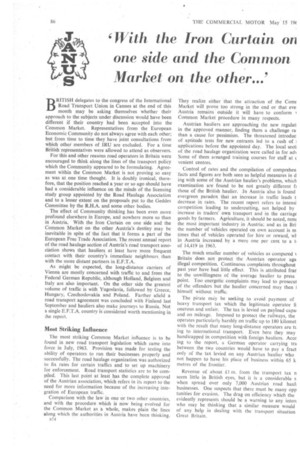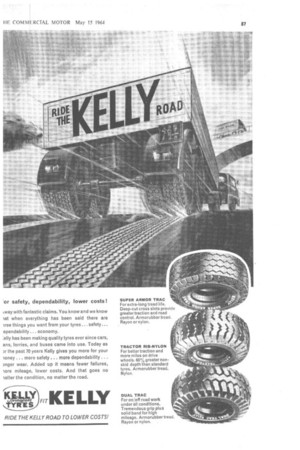'With the Iron Curtain on one side and the Comnion Market on the other.:
Page 88

Page 89

If you've noticed an error in this article please click here to report it so we can fix it.
BRITISH delegates to the congress of the International Road Transport Union in Cannes at the end of this month may be asking themselves whether their approach to the subjects under discussion would have been different if their country had been accepted into the Common Market. Representatives from the European Economic Community do not always agree with each other; but from time to time they have joint consultations from which other. members of IRU are excluded. For a time British representatives were allowed to attend as observers.
For this and other reasons road operators in Britain were encouraged to think along the lines of the transport policy which the Community appeared to be formulating. Agreement within the Common Market is not proving so easy as was at one time thought. It is doubly ironical, therefore, that the position reached a year or so ago should have had a considerable influence on the minds of the licensing study group appointed by the Road Haulage Association and to a lesser extent on the proposals put to the Geddes Corrunittee by the R.H.A. and some other bodies.
The effect of Community thinking has been even more profound elsewhere in Europe, and nowhere more so than in Austria. With the Iron Curtain on one side and the Common Market on the other Austria's destiny may be inevitable in spite of the fact that it forms a part of the European Free Trade Association. The recent annual report of the road haulage section of Austria's road transport association shows that hauliers at least have more frequent contact with their country's immediate neighbours, than with the more distant partners in E.F.T.A.
As might be expected, the long-distance carriers of Vienna are mostly concerned with traffic to and from the Federal German Republic, although Holland, Belgium and Italy are also important. On the other side the greatest volume of traffic is with Yugoslavia, followed by Greece, Hungary, Czechoslovakia and Poland. Farther afield a road transport agreement was concluded with Finland last September and hauliers also make journeys to Russia. Not a single E.F.T.A. country is considered worth mentioning in the report.
Most Striking Influence
The most striking Common Market influence is to be found in new road transport legislation which came into force in July, 1963. Provision was made for testing the ability of operators to run their businesses properly and successfully. The road haulage organization was authorized to fix rates for certain traffics and to set up machinery for enforcement. Road transport statistics are to be compiled. This last point at least has the complete approval of the Austrian association, which refers in its report to the need for more information because of the increasing integration of European traffic.
Comparison with the law in one or two other countries, and with the procedure which is now being evolved for the Common Market as a whole, makes plain the lines along which the authorities in Austria have been thinking.
354 They realize either that the attraction of the Corns Market will prove too strong in the end or that eve Austria remains outside it will have to conform Common Market procedure in many respects.
Austrian hauliers are approaching the new regulat in the approved manner, finding them a challenge ra than a cause for pessimism. The threatened introduc of aptitude tests for new entrants led to a rush of applications before the appointed day. The local sect of the road haulage organization were called in for ad-% Some of them arranged training courses for staff at venient centres.
Control of rates and the compilation of comprehen facts and figures are both seen as helpful measures in d log with some of the Austrian haulier's problems, which examination are found to be not greatly different fi those of the British haulier. In Austria also is found evergreen paradox that an increase in traffic leads t decrease in rates. The recent report refers to intensi competition leading to undercutting, not helped by• increase in traders' own transport and in the carriage goods by farmers. Agriculture, it should be noted, rem; the most important industry in Austria; and as in Bri the number of vehicles operated on own account is in times that of vehicles operated for hire or reward, wl in Austria increased by a mere one per cent to a t of 14,419 in 1963.
The much smaller number of vehicles as compared 1. Britain does not protect the Austrian operator aga illegal competition. Continuous complaints throughout past year have had little effect. This is attributed frar to the unwillingness of the average haulier to press point. Too energetic complaints may lead to prosecut of the offenders but the haulier concerned may then I himself without traffic.
The pirate may be seeking to avoid payment of heavy transport tax which the legitimate operator fi onerous and unfair. The tax is levied on payload capai and on mileage. Imposed to protect the railways, the operates particularly harshly on traffic up to 180 kilomet with the result that many long-distance operators are tt jog to international transport. Even here they may handicapped in competition with foreign hauliers. Accc log to the report, a German operator carrying tra between the two countries would have to pay a fract only of the tax levied on any Austrian haulier who not happen to have his place of business within 65 k metres of the frontier.
Revenue of about rn. from the transport tax n seem little in British eyes, but it is a considerable s when spread over only 7,000 Austrian road haul, businesses. One suspects that there must be many opp tunities for evasion. The drag on efficiency which the evidently represents should be a warning to any inter( who may be thinking that a similar measure would of any help in dealing with the transport situation Great Britain.
S way with fantastic claims. You know and we know lat when everything has been said there are iree things you want from your tyres ... safety... ependability. ... economy.
:elly has been making quality tyres ever since cars, ans, lorries, and buses came into use. Today as )r the past 70 years Kelly gives you more for your ioney ... more safety. „ . more dependability. ... )nger wear. Added up it means fewer failures, lore mileage, lower costs. And that goes no latter the condition, no matter the road.
HTICELLY




































































































































